 | TODAY IN SCIENCE HISTORY NEWSLETTER - 27 SEPTEMBER |
| Feature for Today |
 On 27 Sep 1838, Bernard Courtois died. Iodine became known as a new element from the serendipitous discovery he made. While routinely processing the ash from seaweed to recover sodium and potassium compounds, he released a curious violet vapour that condensed into attractive crystals.He had to leave to others the confirmation of his hunch that this was a new element. On 27 Sep 1838, Bernard Courtois died. Iodine became known as a new element from the serendipitous discovery he made. While routinely processing the ash from seaweed to recover sodium and potassium compounds, he released a curious violet vapour that condensed into attractive crystals.He had to leave to others the confirmation of his hunch that this was a new element. Thus seaweed, surely one of the most unlikely places to discover a new element, is recorded in the history of chemistry for yielding the substance that would in modern times be added to table salt as a health measure to prevent goitre. You can read more about Bernard Courtois and how he discovered iodine in this excerpt from The Discovery of the Elements (1934). |
| Book of the Day | |
|
| Quotations for Today | |
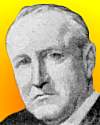 | In size the electron bears the same relation to an atom that a baseball bears to the earth. Or, as Sir Oliver Lodge puts it, if a hydrogen atom were magnified to the size of a church, an electron would be a speck of dust in that church. |
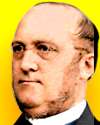 | The weeds of a seemingly learned and brilliant but actually trivial and empty philosophy of Nature which, after having been replaced some 50 years ago by the exact sciences, is now once more dug up by pseudo scientists from the lumber room of human fallacies, and like a trollop, newly attired in elegant dress and make-up, is smuggled into respectable company, to which she does not belong. |
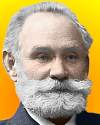 | One can truly say that the irresistible progress of natural science since the time of Galileo has made its first halt before the study of the higher parts of the brain, the organ of the most complicated relations of the animal to the external world. And it seems, and not without reason, that now is the really critical moment for natural science; for the brain, in its highest complexity—the human brain—which created and creates natural science, itself becomes the object of this science. |
| Quiz | |
| Before you look at today's web page, see if you can answer some of these questions about the events that happened on this day. Some of the names are very familiar. Others will likely stump you. Tickle your curiosity with these questions, then check your answers on today's web page. | |
| Births | |
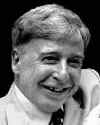 | Robert Edwards, born 27 Sep 1925, was a British medical researcher who, with Patrick Steptoe, perfected in-vitro fertilization of the human egg. Their technique made possible in the birth of Louise Brown, the world's first “test-tube baby.” In which decade did this birth occur? In which decade did this birth occur? |
 | Hermann Kolbe, born 27 Sep 1818, was a German chemist who accomplished the first generally accepted synthesis of a certain kind, with a result that was strikingly different from prior work in chemistry. What was his accomplishment? What was his accomplishment? |
| Deaths | |
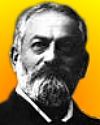 | Auguste Michel-Levy , (1844 -1911) was a French geologist and mineralogist who was a pioneer in microscopic petrology. What is petrology? What is petrology? |
| Events | |
On 27 Sep of a certain year, scientists at the Naval Aircraft Radio Laboratory near Washington, D.C., demonstrated that if a ship passed through a radio wave being broadcast between two stations, that ship could be detected, the essentials of radar. In which decade did this occur? In which decade did this occur? | |
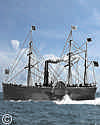 | In 1854, the first great disaster involving an Atlantic Ocean liner occurred when a steamship sank with 300 people aboard. What was the name of this steamship? What was the name of this steamship? |
| Answers |
| When you have your answers ready to all the questions above, you'll find all the information to check them, and more, on the September 27 web page of Today in Science History. Or, try this link first for just the brief answers. Fast answers for the previous newsletter for September 26: Oak Ridge • lactic acid • Levi Strauss • yellow fever • Portland cement • Oracle, Arizona, U.S.A. for two years. |
| Feedback |
 If you enjoy this newsletter, the website, or wish to offer encouragement or ideas, please send feedback by using your mail reader Reply button. If you enjoy this newsletter, the website, or wish to offer encouragement or ideas, please send feedback by using your mail reader Reply button. Your click on a StumbleUpon, Google+ or Facebook social button on the site webpages is also a welcome sign of appreciation. Thank you for using them. |
| Copyright |
| To find citations for quotations go to the corresponding webpage by clicking on the “quotes” balloon icon. Sources for the thumbnails appear on today's webpage with the corresponding item. � This newsletter is copyright 2013 by todayinsci.com. Please respect the Webmaster's wishes and do not put copies online of the Newsletter � or any Today in Science History webpage. (If you already have done so, please remove them. Thank you.) Offline use in education is encouraged such as a printout on a bulletin board, or projected for classroom viewing. Online, descriptive links to our pages are welcomed, as these will provide a reader with the most recent revisions, additions and/or corrections of a webpage. For any other copyright questions, please contact the Webmaster by using your mail reader Reply button. |
--
If you do not want to receive any more newsletters, Unsubscribe
To update your preferences and to unsubscribe visit this link


Δεν υπάρχουν σχόλια:
Δημοσίευση σχολίου